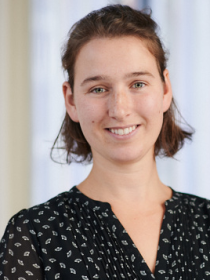mr. dr. C.T. (Ceciel) Nieuwenhout

Current Projects:
MODES (2025-2029)
To ensure that the variable supply of solar and wind energy is matched to energy demand and there is always enough energy, the organization of the energy sector must change. A broad consortium of Dutch knowledge institutions (MODES) is focusing on how the Dutch energy sector should be organized during and after the energy transition. MODES focuses on the question: What combination of market organization, rules and policies reduce risks and lead to an energy system that can meet society's demands (both in terms of sustainability and reliability)? Nieuwenhout's (and the Law Faculty’s) role within MODES is to lead the work package dealing with market organization for the North Sea energy system. Nieuwenhout, together with the doctoral student hired for this purpose, is investigating how the legal and regulatory framework needs to be adjusted to get the system that has the most societal benefits. For this, for example, the rules on expansion of energy infrastructure need to be optimized: currently, this is determined separately for electricity and gas. Also, in the transition toward 2050, there must remain enough investment security for wind farm developers and infrastructure developers. Yulia Sergeeva is working on this project as a PhD student.
HybridLabs (2023-2030)
The goal of HybridLabs is to accelerate the development and deployment of offshore renewable technologies that support energy transitions, food transitions and ecological transitions. The researchers aim to achieve this by improving the design, control, monitoring and logistics of those energy sources. The Faculty of Law of the UG contributes by investigating the legal framework for innovative technologies such as floating offshore wind and the combination between offshore wind and food production. Nieuwenhout works on this project together with two PhD students: Apostolia Pataki and Yegor Osipov. More information is available on: https://www.rug.nl/rechten/news/archief/2023/financieringsproject-hybridlabs?lang=en.
InterOpera (2022-2026)
The InterOPERA project, funded by the EU (HorizonEurope), and coordinated from the UG by Dr Ceciel Nieuwenhout, is working on the next steps towards a "multi-vendor, multi-terminal" HVDC network (a direct current network suitable for long distances, made by several developers). This type of network can start to be used in the North Sea to connect wind farms and provide connections between countries. In InterOPERA , the focus is on the next few years, in which the first large-scale demonstration projects will be developed and a legal framework for cooperation must be ready. The RUG plays a key role in the latter. For the first years of the project, Grant Dawson was working as a postdoctoral researcher to develop this legal framework, looking at both the public and private law aspects of cooperation. More information on: https://interopera.eu/.
Inter-oPEn (2024-2028)
IInter-oPEn is a Marie Curie Doctoral Network project focusing on interoperability of “multi-vendor, multi-terminal” HVDC networks in the future. These types of DC networks are suitable for long distances and can begin to be used in the North Sea to connect wind farms and provide connections between countries. This project is similar to previous projects Ready4DC and InterOpera. However, the first difference is that this project looks at the longer term (allowing room for more complex/abstract legal and technical solutions such as open-source technology). Secondly, it links energy law and technology law (IP and IT law), and thus also brings these sections within the faculty together. The third difference is that the doctoral training network is also aimed at educating and bringing together the doctoral students from both the technical and legal sides. What is needed, in order to properly regulate these networks in the future, are technicians who understand the legal language, and lawyers who understand the technical challenges. Donia Ayari is hired as PhD student on this project. More information: https://www.rug.nl/rechten/onderzoek/beurzen-prijzen-en-subsidies/consortiumprojecten/marie-curie-doctoral-networks/inter-open.
POCITYF (2019-2025)
The Horizon Europe project POCITYF is about "positive energy districts" (PEDs), where buildings, networks, inhabitants and e-mobility are cleverly linked together to achieve more sustainable cities. The role of the law school, and specifically researcher Ceciel Nieuwenhout, is to examine the legal framework of the various energy solutions being implemented within the project. The bottom line is that the legal framework creates several barriers to the implementation of PEDs. Nieuwenhout identified these and further explored possible solutions to those barriers. Within the project, the RUG has delivered deliverable 1.3 "Building and Grid Retrofit Regulatory Framework" with an analysis of the international, European and national legal framework for this. In addition, several academic publications are still in preparation. The UG organized a symposium on the energy-positive built environment in July 2024, where more than 40 participants considered various aspects of energy transition in the built environment.
More information: https://www.rug.nl/rechten/onderzoek/beurzen-prijzen-en-subsidies/consortiumprojecten/horizon-europe/pocityf
Afgeronde projecten:
Ready4DC (2022-2023)
The Ready4DC project, funded by the EU (HorizonEurope, Coordination and Support Action), worked on preparing the next steps toward a "multi-vendor, multi-terminal" HVDC network (a DC network suitable for long distances, created by several developers). This type of network can begin to be used in the North Sea to connect wind farms and establish connections between countries. In Ready4DC, the focus was on identifying the technical and legal barriers, and exploring solutions. The implementation of those solutions is taking place in other projects, such as InterOpera and Inter-oPEn. More information available at: https://www.rug.nl/rechten/onderzoek/beurzen-prijzen-en-subsidies/consortiumprojecten/horizon-europe/ready4dc.
PROMOTioN (2016-2020)
Progress on Meshed Offshore HVDC Electricity Grids in the North Sea (Horizon2020 - LCE05). In this project, Nieuwenhout studied the legal aspects of the development of an offshore electricity network in the North Sea and the sources of electricity to be connected to this network. She was task leader on the legal and regulatory framework as part of the work package on regulation and financing. Project documentation is available via: https://www.dnv.com/cases/eu-horizon-2020-project-promotion/.
